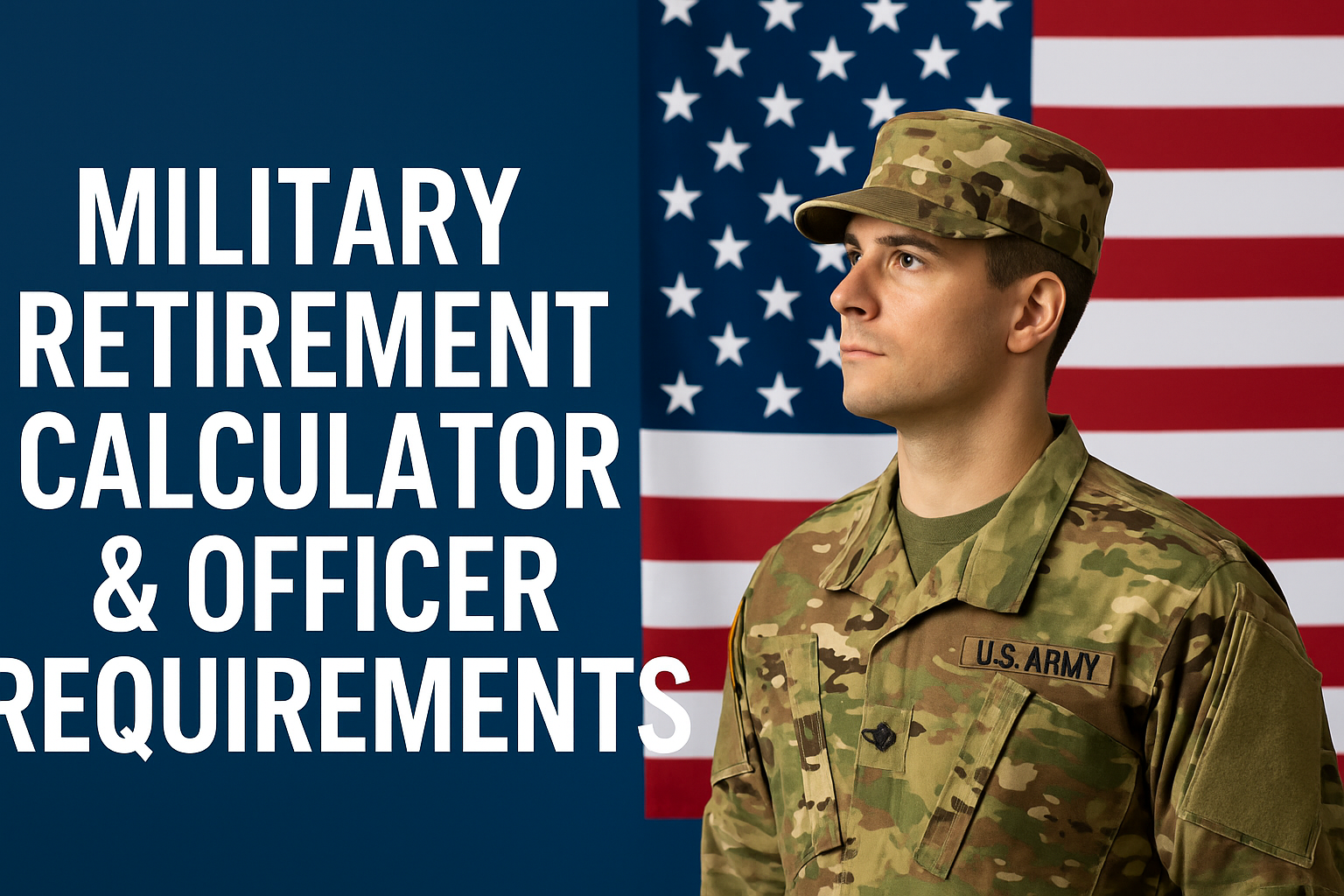🧮 Military Retirement Calculator & Officer Requirements – A Complete Guide
Introduction
Thinking about a long-term career in the military? Whether you’re planning your future or already serving, two important things you should understand are:
- Military Retirement Calculator – How much will you earn after retirement?
- Military Officer Requirements – What does it take to become an officer?
In this guide, we’ll explain both topics in easy-to-understand language, especially for U.S. military personnel and those planning to join.
🪖 What Is a Military Retirement Calculator?
A military retirement calculator helps you estimate how much money you will receive monthly or yearly after retiring from the military. It considers:
- Years of service
- Final basic pay
- Retirement system (like High-3 or BRS)
- Rank at retirement
🔢 Types of Military Retirement Systems
1. High-3 Retirement System
- You must have joined before January 1, 2018.
- Your retirement pay is based on the average of your highest 36 months of basic pay.
- Formula:
Years of Service × 2.5% × High-3 Pay
Example:
If you served 20 years and your average pay was $4,000/month:
→ 20 × 2.5% = 50% × $4,000 = $2,000/month
2. Blended Retirement System (BRS)
- For those who joined on or after January 1, 2018.
- Includes both:
- Monthly pension
- Contributions to the Thrift Savings Plan (TSP) (like a 401(k))
BRS Formula:Years of Service × 2.0% × Final Basic Pay
TSP Matching:
- Up to 5% of your basic pay matched by the military.
3. Final Pay System
- Applies to people who joined before September 8, 1980.
- Retirement pay is based on final month’s basic pay.
🧠 Why Use a Retirement Calculator?
A retirement calculator gives you:
- Estimated monthly income after service
- Clear idea of long-term financial benefits
- Motivation to serve more years or plan early exits
You can find official calculators on:
📋 Example: Military Retirement Estimate
Let’s say:
- You’re an E-7 (Sergeant First Class)
- You serve 20 years
- Final basic pay = $4,800/month
- You fall under the High-3 system
Calculation:
- 20 × 2.5% = 50%
- 50% of $4,800 = $2,400 per month in retirement pay
👮 Military Officer Requirements (USA)
Becoming a military officer means more responsibility, higher rank, better pay, and stronger retirement benefits.
Here are the general requirements:
| Requirement | Details |
|---|---|
| Citizenship | Must be a U.S. citizen or legal resident |
| Age Limit | 18–35 years (some branches allow older with waivers) |
| Education | Bachelor’s degree or higher |
| ASVAB Test | Good score required |
| Physical Fitness | Must pass military fitness test |
| Officer Training | Must attend OCS (Officer Candidate School) or similar |
| Leadership Skills | Must demonstrate strong leadership |
| Clean Background | No serious criminal offenses |
🏫 How to Become a Military Officer
There are a few paths to becoming an officer:
1. OCS (Officer Candidate School)
- Open to enlisted members and civilians
- Training lasts 10–12 weeks
- Teaches military leadership, tactics, and discipline
2. ROTC (Reserve Officers’ Training Corps)
- Offered at many U.S. colleges
- Complete during your bachelor’s degree
- Commissioned upon graduation
3. Military Academies
- West Point, Naval Academy, Air Force Academy, etc.
- Highly competitive
4. Direct Commission
- For professionals like doctors, lawyers, chaplains
💬 Top FAQs
Q: What is the minimum time to get military retirement?
A: Typically 20 years of active service.
Q: Can I retire earlier than 20 years?
A: Yes, but full retirement benefits usually begin at 20 years. Early retirement may reduce your pension.
Q: How much do military officers make after retirement?
A: Depends on years served and rank, but generally ranges from $2,000 to $8,000/month.
Q: Do military retirees get benefits for life?
A: Yes, including pension, healthcare (TRICARE), base access, and more.
✅ Final Thoughts
Understanding the military retirement calculator and officer requirements is crucial if you’re planning a career in the armed forces. Whether you’re just starting or already serving, this knowledge helps you:
- Plan your future
- Estimate your retirement income
- Set career goals
If you want better pay, faster promotion, and long-term benefits—becoming an officer is a smart path.






